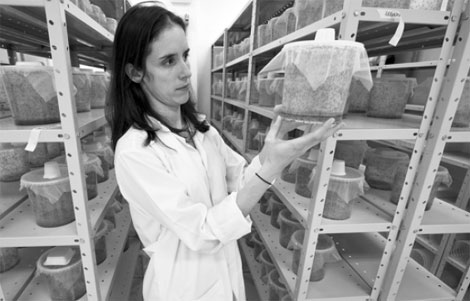New mosquitoes to fight dengue in Brazil
It's a dry winter day in southeast Brazil, but a steamy tropical summer reigns inside the labs at Oxitec, where workers are making an unusual product: genetically modified mosquitoes to fight dengue fever.
The British biotech firm has altered the DNA of the Aedes aegypti mosquito to prevent it from spreading the potentially deadly virus, which has hit Brazil harder than any other country this year.
Oxitec's new factory in the Brazilian city of Campinas, outside Sao Paulo, is the first in the world to launch production of genetically modified mosquitoes to target dengue.
|
A production supervisor looks at transgenic Aedes aegypti mosquitoes kept in a container at the lab in Campinas, Brazil. These mosquitoes were genetically modified to fight dengue. Nelson Almeida / Agence France-Presse |
"This is the perfect environment for the Aedes aegypti mosquito, the main vector for dengue, to grow and reproduce," said Portuguese biologist Sofia Pinto, 32, as she leads a tour of the sweltering labs.
In one room, bottles full of genetically modified males await release into the wild.
The mosquitoes have been bred to carry a sort of genetic self-destruct mechanism that causes their offspring to die before they reach sexual maturity, preventing them from reproducing.
The company says if sufficient numbers of GM males are released into the wild, they will mate with females on a large enough scale to significantly reduce or even wipe out the dengue-carrying population.
"Once they're released, the mosquitoes look for wild females to copulate and reproduce. But thanks to this genetic modification, which is transmitted, all their offspring die before reaching adulthood, so they can neither bite nor transmit the dengue virus," Pinto told AFP.
Brazilian authorities have not yet given the go-ahead to sell the mosquitoes.
Genetic-engineering skeptics have raised questions about the impact they could have on the ecosystem.
Pinto downplayed those concerns, saying the Aedes aegypti is an invasive species that originated in Africa and was only introduced to Brazil in the modern era.
"It's an urban mosquito, and eliminating it from this environment will not have a major impact. It's not a pollinator nor a specific food source for other insects or animals," she said.
(China Daily 08/28/2014 page11)















